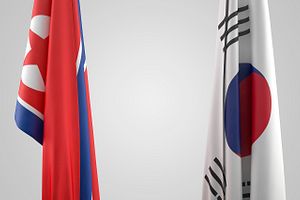South Korea’s Unification Ministry, which oversees South Korea’s policy toward the North, is facing harsh criticism in the wake of an incident in which a South Korean citizen was killed and his body allegedly burned while at sea by North Korean soldiers.
As a corollary, the incident revealed that the Unification Ministry has no official channels to contact the North to check and demand an explanation. Now there is a growing skepticism over the ministry’s role.
An official of the Unification Ministry said in a meeting with reporters on September 24 that the ministry has no means of contacting the North regarding the incident.
North Korea cut off all official communication channels between the two Koreas on June 9, taking issue with the distribution of anti-Pyongyang leaflets by groups of North Korean defectors. The hotline between South Korean President Moon Jae-in and North Korean leader Kim Jong Un, landline military communication channels, and communication vessels were all cut off. Later, on June 16, North Korea blew up the joint inter-Korean liaison office at the Kaesong Industrial Complex.
This means all communication channels that had been established since the April 27 Declaration of Panmunjom in 2018 — from the leaders of the two Koreas to the working level — have been closed.
Some also suggested that the incident could have been prevented, criticizing the ministry over its belated response.
Shin Won-sik, a lawmaker and member of South Korea’s People Power Party, the main opposition, said that South Korean authorities did not take any action for seven hours after they were informed about the stranded official.
Shin said South Korea’s government learned at 3:30 p.m. on September 22 that the official was found in the North, adding that the Ministry of National Defense should have consulted with the Unification Ministry quickly to reach out to the North and make sure the official’s safety is guaranteed.
However, the ministry failed to respond and work with other government bodies or intelligence, Shin said.
This is not the first time the role of the Unification Ministry has been questioned. In fact, how to reform the ministry has been one of the most popular topics at the National Assembly over the past few years.
One issue among many pointed out is that the ministry has no authority to independently form policies regarding North Korea. This is because all important North Korea matters and policies are handled by the Security Office at the Presidential Blue House. North Korea is also aware of this, so it often bypasses the unification ministry and talks to the Presidential Office directly.
Another issue is that the ministry is supposed to be in charge of “all matters” about North Korea, ranging from politics, diplomacy, military, and the economy to social and cultural issues, but in fact, there are other ministries that are more specialized in each of these fields. Often the division of labor among these bodies is unclear when it comes to North Korean matters.
But the biggest issue is that the ministry itself seemed out of step with reality.
On the day when the South Korean public servant was shot by North Korean troops, the Unification Ministry posted on its official social media channels a message about the importance of achieving peace, which is seen by many online users as inappropriate.
Amid growing concerns over the incident, the Unification Ministry uploaded two posts to its official Twitter account on that day saying, “the Berlin Wall collapsed and West and East Germany became one with Germany 30 years ago! What lessons can we learn from German reunification?”
The ministry also cited President Moon as saying that unification is a process in which both parties co-exist and restore the national community, adding that unification will be naturally achieved by an agreement between the two Koreas someday once peace is established.

































